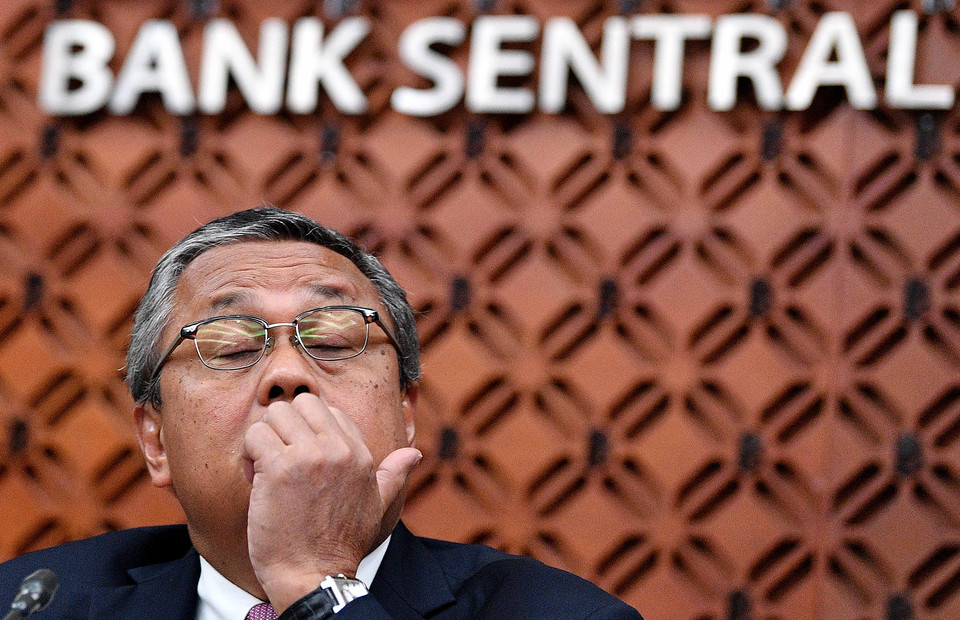Global investors still have confidence in the Indonesian economy and may back a drive to buy new debt securities issued to finance the government’s stimulus package for mitigating the Covid-19 pandemic, Perry Warjiyo, the governor of Bank Indonesia, the country’s central bank, said on Wednesday.
“I just contacted global investors. They are still quite confident with Indonesia,” Perry said in a teleconference on Thursday.
The governor said the largest economy in Southeast Asia may still avoid a recession this year and expand by more than 2.3 percent.
The key to this outlook was the government’s Rp 405 trillion ($24 billion) stimulus plan to counter the impact of the coronavirus pandemic on small businesses and families living below poverty line.
Perry said he suggested the government enlarge the size of its dollar-denominated global bond issuance this year – currently set at $8 billion – to finance the plan.
The government can also increase the size of its regular rupiah-denominated bond auction to Rp 20 trillion from Rp 15 trillion.
A government regulation in lieu of law (Perppu) issued on Tuesday granted the central bank the power to buy the so-called recovery bonds directly from the government.
Previously, Bank Indonesia could only buy government bonds in the secondary market.
But Perry said with ample interest from global investors, Bank Indonesia may not need to get involved in the primary market after all.
“The recovery bond mentioned earlier is a [backup] plan,” Perry said.
“We should get the umbrella out before it rains,” he said.
Perry said Bank Indonesia would step into the primary market when the bond yields have exceeded tolerance limits.
“Under abnormal conditions, when there are no buyers and yields are too high, Bank Indonesia becomes a lender of last resort and is allowed to enter the primary market,” Perry said.
Inflation Under Control
The central bank buying government bonds means it is practically printing money and increasing the amount of money in circulation at the risk of accelerating inflation.
Inflation in Indonesia was at 2.96 percent in March, slowing slightly from 2.98 percent in February.
Perry said inflation risk this year was low, with expectations of low consumer demand and expectation during the Covid-19 pandemic.
Also, imported inflation would be tame, he said.
“In normal time, imported inflation is low already, let alone under this condition. Businesses refrain from passing through the exchange rate cost to customers as demand is low,” Perry said.
Lastly, the government has said that food supplies will remain plentiful during the pandemic.
“So, people don’t have to panic, they don’t need to hoard goods. Stay calm and prices will remain stable,” he said.
No Capital Control, Rupiah Undervalued
Perry also said the central bank would not start imposing capital control to stabilize the rupiah’s fluctuation.
The central bank governor said the currency is now undervalued and would move toward Rp 15,000 per US dollar by the end of this year.
The 1999 Law on Foreign Exchange does not recognize capital control, he said.
Besides, the gap between Indonesia’s domestic savings and its capital needs remains large.
“We need foreign investment, both as direct investment and portfolio investment in stocks and bonds,” Perry said.
For now, more than 80 percent of Indonesia’s $170 billion annual export proceeds have been brought home by exporters but not yet converted to rupiah.
“We have no plans to require exporters to convert dollars into rupiah. We understand that the business world needs dollars in the future,” Perry said.
For those who want to make the conversion, Bank Indonesia has provided a hedging facility to ensure that dollars are available to the exporters in the future at the same exchange rate that they set at present.
“Domestic non-delivery forward is the hedging that we’ve prepared for businesses,” he said.

